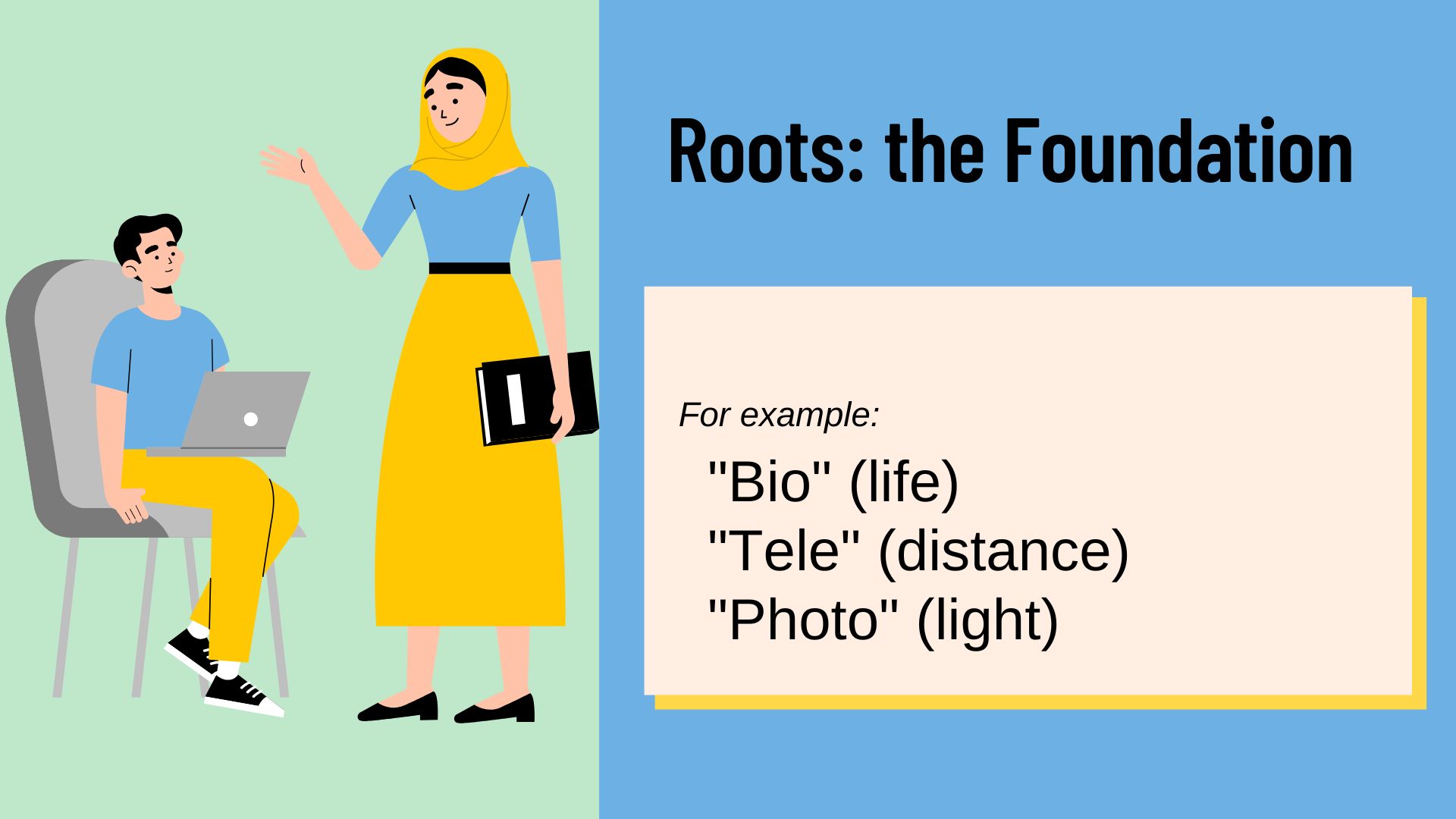Root Words

The root is the main part of a word that carries its core meaning. They often cannot stand alone and need prefixes (added to the beginning) or suffixes (added to the end) to form complete words.
Did You Know: Most of our root words in English came from the Greek and Latin languages.
|
Root Word |
Meaning |
Examples |
|
aqua |
water |
aquarium, aqueduct |
|
bene |
good |
benefit, benevolent |
|
mal |
bad |
malice, malfunction |
|
dict |
say |
dictate, dictionary |
|
port |
carry |
transport, portable |
Circle the Root Words
Instructions: Look at each group of words. Find and circle the root word in each set.
-
Jumping, Jumper, Jump
-
Reading, Reader, Read
-
Happily, Happy, Happiness
-
Running, Run, Runner
-
Singer, Singing, Sing
-
Helpful, Help, Helpless
-
Writing, Written, Write
-
Cleaner, Cleaning, Clean
-
Playful, Playing, Play
-
Teacher, Teach, Teaching
Create new words by adding prefixes & suffixes to root words
All the words below are roots; find a prefix (at the beginning) or a suffix (at the end) to create new words.
Prefixes:
Adding Meaning at the Beginning
It is called a prefix, which is a type of affix placed at the beginning of a word. Here are some examples:
.jpg)
Example:
Root word: Happy
-
-
With Prefix: Unhappy
-
With Suffix: Happiness
-
Suffixes:
Adding Meaning at the End
This type of affix is added at the end of words, like a finishing touch. Here are some examples:
.jpg)
Now Try These:
-
Kind → ________ (Add a prefix)
-
Play → ________ (Add a suffix)
-
Clean → ________ (Add a prefix)
-
Teach → ________ (Add a suffix)
-
Like → ________ (Add a prefix)
-
Move → ________ (Add a suffix)
-
Correct → ________ (Add a prefix)
-
Help → ________ (Add a suffix)
-
Write → ________ (Add a prefix)
-
Use → ________ (Add a suffix)
Common Latin Root Words and Their Meanings
-
Patho - (Greek origin, but commonly used in Latin-based vocabulary)
-
Empathy – The ability to understand and share the feelings of others.
-
Sympathy – Feelings of pity and sorrow for someone else’s misfortune.
-
Neuropathy – Disease or dysfunction of the nerves.
-
Pathology – The study of diseases.
-
Psychopath – A person suffering from a severe mental disorder that affects behavior.
-
Sociopath – A person with a personality disorder marked by antisocial behavior.
-
-
Meaning: Pain, suffering, or disease.
-
Look for: path-, pathy-
-
Tenere - (Latin: "tenere" = to hold, keep, stretch)
-
Tenacity – The quality of being persistent and determined.
-
Contend – To compete or struggle against something.
-
Intend – To have a purpose or plan in mind.
-
Tenure – The period during which someone holds a position.
-
Retain – To keep possession of something.
-
Sustain – To support or uphold over time.
-
Detain – To hold back or keep someone in custody.
-
-
Meaning: To hold, maintain, or stretch.
-
Look for: ten-, tain-, tin-
-
Poly - (Greek origin, but used in Latin vocabulary)
-
Polymer – A substance made of many similar units bonded together.
-
Polygon – A shape with multiple sides.
-
Deplete – To use up resources, making them scarce.
-
Accomplish – To complete or fulfill something.
-
Plethora – An abundance or excess of something.
-
Supplement – Something added to complete or enhance.
-
Implement – To put something into action or apply.
-
Replication – The process of copying or duplicating.
-
-
Meaning: Many, multiple, or to fill.
-
Look for: pli-, ple-, poly-, plen-
Real-Life Examples
-
Aqua: An aquarium is a tank full of water for fish and other water animals.
Root word: Aquarium -
Bene: A benefactor is someone who does a benefit to someone else, generally with money for a good cause.
Root word: Benefactor -
Mal: Malfunction is when something is not working correctly, like a broken toy
Root word: Malfunction
Practice Questions
-
What is the root word of happily?
-
Find the root word in player.
-
Add un- to the word kind. What new word do you get?
-
Add -ing to the word jump.
Fun Facts
- Most English words originate from either Latin or Greek.
- You may know these words but be unsure of their meaning–based on root words you know, you can guess their meanings.
- The very name television comes from the roots tele (far) and vision (sight).
Things You Have Learned!
-
Root words are the key foundational elements of language..
-
Identifying roots helps with strong vocabulary and understanding.
-
English is a borrowing language: Most modern-day words can be traced back to Latin or Greek origins with prefixes and suffixes, which make them easier to understand when you break them down.
CBSE Schools In Popular Cities
- CBSE Schools in Bangalore
- CBSE Schools in Mumbai
- CBSE Schools in Pune
- CBSE Schools in Hyderabad
- CBSE Schools in Chennai
- CBSE Schools in Gurgaon
- CBSE Schools in Kolkata
- CBSE Schools in Indore
- CBSE Schools in Sonipat
- CBSE Schools in Delhi
- CBSE Schools in Rohtak
- CBSE Schools in Bhopal
- CBSE Schools in Aurangabad
- CBSE Schools in Jabalpur
- CBSE Schools in Jaipur
- CBSE Schools in Jodhpur
- CBSE Schools in Nagpur
- CBSE Schools in Ahmednagar
- CBSE School In Tumkur











